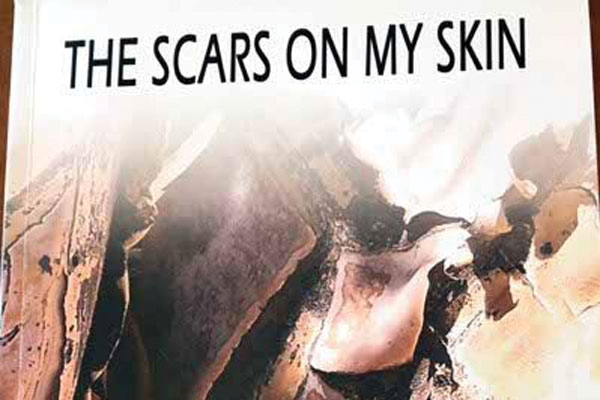
Title: The Scars on My Skin Author: Keamogetsi J. Molapong ISBN: 978-99945-78-58-0 Publisher: Township Productions (2014)
MY first encounter with the anthology, The Scars on My Skin, was a bit misleading. I mistook Keamogetsi J Molapong for one of those poets, who have been victims of the status quo; those who consciously or unconsciously romanticise history and events currently unfolding in their nations.
REVIEWED BY BENIAH TAKUNDA MUNENGWA

But I was wrong. This anthology delves deep into the characteristics of post-colonial Namibia, making the author a patriotic African. His poetry in this anthology explores the themes of disappointment and resentment over failed post-colonial governance systems in Africa.
Through poems such as Poverty, Black Man, What do you Fear? and Fake Money he explores the subject of poverty in independent Namibia, which is typical of many African countries.
African leaders amass weapons from Western countries benefiting from the economic imbalances of post-colonial Africa as reflected in the piece, This Law, which demonstrates how patriotism is often used to justify capitalism.
It is in the poem Poverty that it is brought out that, instead of trying to solve the problem of poverty, they would rather debate on the amount of poverty that the ordinary citizen should take.
- Chamisa under fire over US$120K donation
- Mavhunga puts DeMbare into Chibuku quarterfinals
- Pension funds bet on Cabora Bassa oilfields
- Councils defy govt fire tender directive
Keep Reading
The poet uses irony to show that those, who used to decry poverty have become its chief orchestrators now that they are in power, often forcing citizens to take action and confront the leadership as captured in the poem, Let’s Go to Parliament.
The poem has no kind words for “ignorant leaders”, who engage in so-called bilateral agreements, soft loans and structural adjustment programmes in exchange for power and fortune in the poem, This Land.
The poem 35% Massacre also decries exorbitant taxation and here the poet, just like in most of the poems in the collection, uses a sombre tone. If it is not disappointment, then it is death or something catastrophic.
The deliberate silencing of voices and negligence of some ideas from people who did not fight the war is also evident. These traits, sourced from apt observations, run through the collection like a thread.
In the poem, The Cry of a Fallen Man, vote buying in exchange of goodies, which then affect the process of democratic revival of his beloved nation is brought to the fore.
Being asked to drop your way of thinking, in the process getting ideologically colonised by a pre-set rigid way of thinking, which are also passed only at rallies resulting in stagnation and paralysis of the normal ways of operating.
From the poems Fugitive, If My Poetry Can’t Move You and The Sharp End of Poetry one observes the poet feels for the underdog. He is a man, who cannot keep his resentment to himself.
In a nutshell, the entire collection is centred on political disillusionment and delves into aspects of the poet’s social life. The first poem, A Single Door reflects of his development and expression of hope to the grief, which emanates from the loss of his short lived fatherhood, after the unexpected death of his child.
The Great Thirst also mocks beer drinkers, who make themselves prisoners of intoxication. Apart from mocking others, he also sees wrong traits in his love life in the poem, My Love, I was in the Wrong, where he asks for forgiveness, admitting that he succumbed to the weakness of his eyes by leaving his woman for another.
After all is said and done, Molapong’s poetry, it is quite clear that in The Sharp End Of Poetry, he writes from the perspective that, all wrongs must move towards the right side of life.
I can say that his background in community theatre should be credited for his bold direction towards social change and it must be a source of inspiration for the National Arts Council of Zimbabwe to sponsor Zimbabwean literature, just like its equivalent in Namibia did for Molapong.
Stylistically speaking, he uses a somewhat subversive technique of arranging his stanzas, allowing him to shape his stanzas and lines in a way that expresses his tone. This is evident in the poem, Broken Down Man and Awaiting among other poems, where the tone is sombre. The arrangement symbolises a falling graph line.
All the letters of the poems’ titles are in upper case and bold, tools, which show that, he the man is serious about dealing with the subject matters in his poetry. He also does not employ full-stops at the end of each and every poem.
This shows that poetry is open ended, with the end result being unknown or obscured. With the use of an elaborative title of the anthology, which is The Scars on My Skin, he shows that he is going to discuss about heart-breaking issues.
You could wonder, what on earth would create scars on his delicate skin. The use of the word, “my” in the title, shows that the poet personalises his troubles and exercises his intellectual ability to enlighten other fellow citizens, not only in Namibia, but across the continent.
He also shuns using very complex diction, something, which makes his poetry much more accessible to the people. This, indeed, is an incisive collection which, though centred on Namibia, reflects the African condition.











